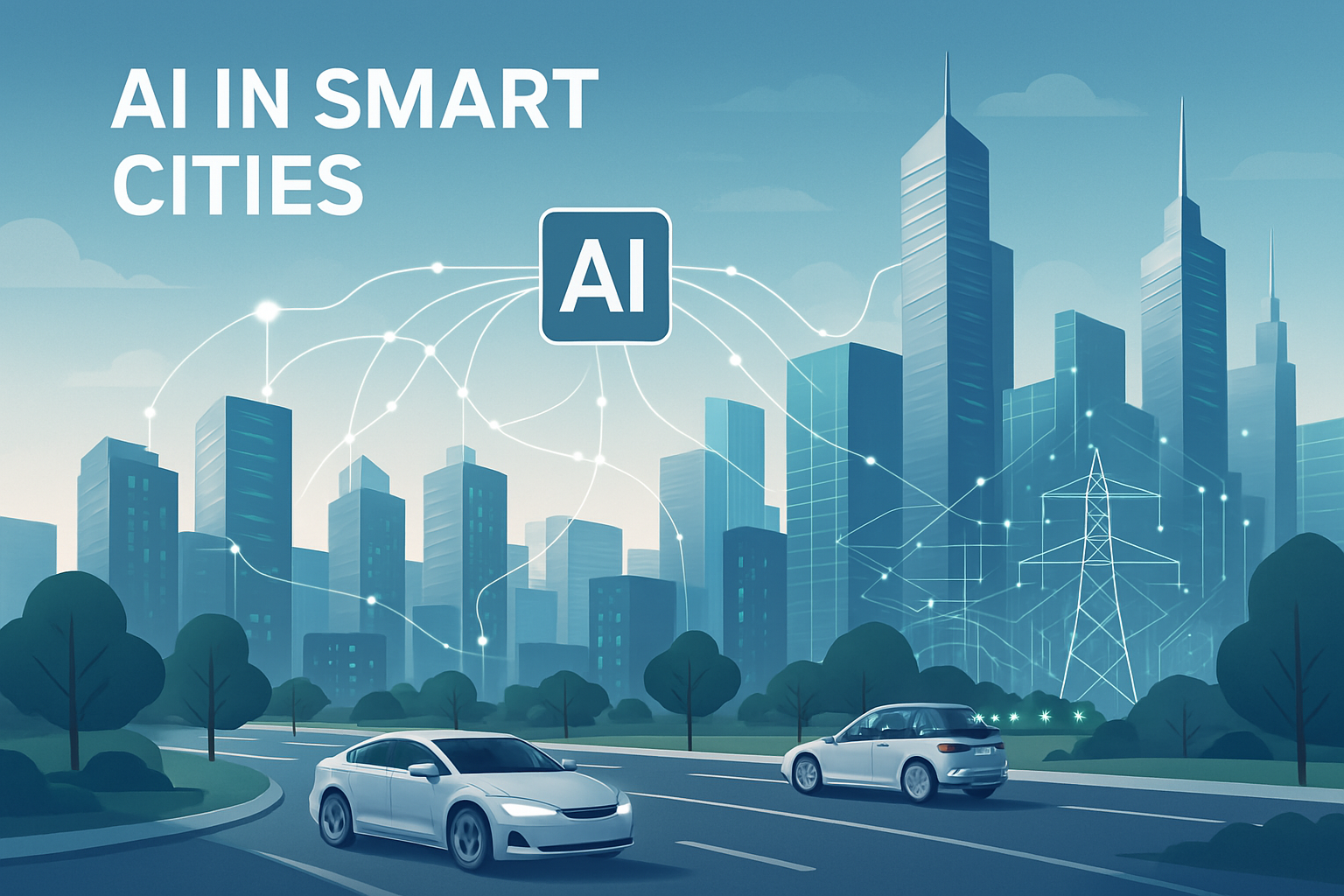
AI in Smart Cities: Optimizing Urban Living and Sustainability
Introduction: The Rise of Intelligent Urban Environments
As urbanization accelerates globally, cities face increasing challenges in managing resources, ensuring public safety, and providing a high quality of life for their residents. Artificial Intelligence (AI) is emerging as a powerful tool to address these complexities, paving the way for the development of “Smart Cities.” These are urban environments that leverage technology and data-driven insights to optimize infrastructure, enhance services, and promote sustainability. This article explores how AI is being integrated into various aspects of urban living, from traffic management and energy consumption to public safety and environmental monitoring, ultimately aiming to create more efficient, resilient, and citizen-centric cities for the future.
AI in Traffic Management and Transportation
Traffic congestion is a major issue in most urban centers, leading to lost productivity, increased pollution, and frustration for commuters. AI offers innovative solutions to optimize traffic flow and improve transportation systems.
- Intelligent Traffic Signal Control: AI algorithms can analyze real-time traffic data from sensors and cameras to dynamically adjust traffic signal timings, reducing waiting times and improving traffic flow.
- Predictive Traffic Management: By analyzing historical traffic patterns and current conditions, AI can predict potential congestion points and suggest alternative routes to drivers, often through smart navigation apps.
- Optimized Public Transportation: AI can help optimize public transport routes, schedules, and vehicle deployment based on demand, reducing wait times and improving the efficiency of services.
- Autonomous Vehicles: While still in development, AI-powered autonomous vehicles (AVs) hold the promise of revolutionizing urban transport by potentially reducing accidents, optimizing traffic flow, and providing on-demand mobility services.
- Smart Parking Solutions: AI can monitor parking availability in real-time and guide drivers to empty spots, reducing the time spent searching for parking and easing congestion.
AI for Energy Management and Sustainability
Smart cities are increasingly relying on AI to manage energy consumption more efficiently and promote sustainable practices.
- Smart Grids: AI can optimize energy distribution in smart grids, balancing supply and demand, integrating renewable energy sources more effectively, and reducing energy loss.
- Energy-Efficient Buildings: AI-powered building management systems can learn occupancy patterns and adjust lighting, heating, and cooling accordingly, minimizing energy waste.
- Optimizing Renewable Energy Integration: AI can help predict the output of renewable energy sources like solar and wind, enabling better integration into the power grid and more stable energy supply.
AI in Public Safety and Security
Ensuring the safety and security of citizens is a paramount concern for any city. AI can enhance these efforts in several ways.
- Predictive Policing (with ethical caveats): AI can analyze crime data to identify patterns and potential hotspots, theoretically allowing for more targeted resource allocation. However, this application is highly controversial due to concerns about bias and potential for misuse.
- Enhanced Surveillance: AI-powered video analytics can monitor public spaces for suspicious activities, identify wanted individuals, or detect accidents and emergencies, alerting authorities more quickly. This also raises significant privacy concerns.
- Emergency Response Optimization: AI can help optimize routes for emergency vehicles, predict the spread of fires, or assist in coordinating disaster relief efforts.
AI in Waste Management and Environmental Monitoring
Efficient waste management and environmental protection are crucial for sustainable urban living.
- Optimized Waste Collection: AI can analyze data from smart bins to optimize waste collection routes, reducing fuel consumption and operational costs.
- Pollution Monitoring and Control: AI-powered sensors can monitor air and water quality in real-time, identifying pollution sources and enabling quicker responses to environmental hazards.
- Water Resource Management: AI can help detect leaks in water distribution systems, predict water demand, and optimize water usage in urban areas.
AI in Citizen Services and Governance
AI can also improve the delivery of public services and enhance citizen engagement.
- AI-Powered Chatbots for Citizen Queries: Providing 24/7 access to information and assistance for common civic issues.
- Personalized Public Service Delivery: AI can help tailor public services to individual citizen needs based on their data (with appropriate privacy considerations).
- Data-Driven Urban Planning: Analyzing urban data to inform decisions about infrastructure development, public transportation, and resource allocation.
Challenges and Ethical Considerations
The deployment of AI in smart cities is not without its challenges and ethical dilemmas:
- Data Privacy and Security: The vast amounts of data collected by AI systems in smart cities raise significant concerns about individual privacy and data security.
- Algorithmic Bias: If AI systems are trained on biased data, they can perpetuate and even amplify existing societal inequalities in areas like policing or resource allocation.
- Job Displacement: Increased automation through AI could lead to job losses in certain sectors, requiring proactive measures for retraining and social support.
- Digital Divide: Ensuring equitable access to the benefits of AI-driven smart city services for all citizens, regardless of their technological literacy or socioeconomic status, is crucial.
- Over-Reliance and Lack of Human Oversight: Decisions with significant human impact should not be solely delegated to AI systems without appropriate human oversight and accountability mechanisms.
Conclusion: Building Smarter, More Human-Centric Cities with AI
Artificial Intelligence holds immense promise for transforming urban environments into smarter, more sustainable, and more livable spaces. From optimizing traffic flow and energy consumption to enhancing public safety and citizen services, the applications of AI are vast and varied. However, as we embrace these technological advancements, it is crucial to address the associated challenges and ethical considerations proactively. By prioritizing transparency, fairness, privacy, and human oversight, we can harness the power of AI to build smart cities that truly serve the needs of all their citizens and contribute to a more sustainable future. The journey towards truly intelligent cities is an ongoing one, requiring careful planning, continuous adaptation, and a commitment to using technology for the betterment of urban life.

Leave a Reply